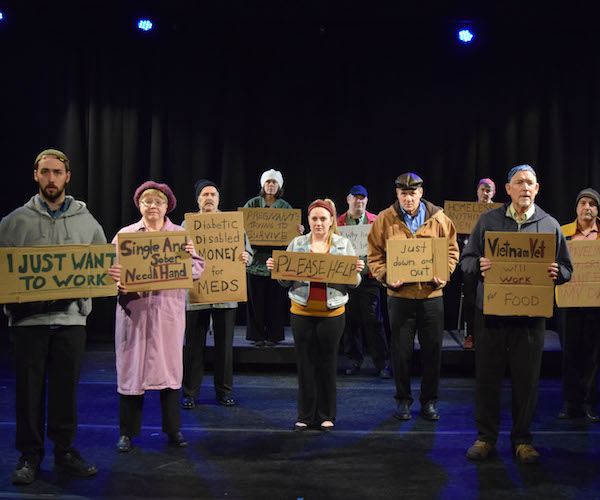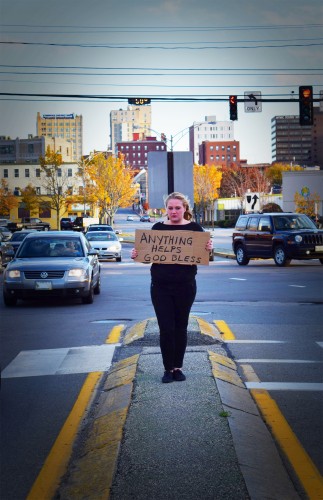Theater Review: “Anything Helps God Bless” — Portland’s Lower Depths
Anything Helps God Bless would benefit from sharpening its dramatic focus, even though that means losing some valuable, but theatrically extraneous, material.
Anything Helps God Bless, written by Al D’Andrea, MK Wolfe, and the Snowlion Repertory Company ensemble. Directed by Al D’Andrea. Original Music by Thomas Adams. Vocals by Alan Forrest McLucas. With Harlan Baker, Samuel Carlson, Cathy Counts, Callie J. Cox, Tom Handel, Patricia Mew, Chris Newcomb, Bob Pettee, Natasha Salvo, Pat Scully, and Eric Darrow Worthley. Staged at Portland Ballet Studio Theater, Portland, ME, December 10 and 11.

A scene from Snowlion Rep’s production of “Anything Helps God Bless.”
By David Greenham
The times are ripe for documentary theater. With the explosion of news sources – both real and fake, apparently – comes an understandable hunger for credible information on which to feed debate. Portland’s Snowlion Repertory Company seized on the opportunity and decided to go sleuthing in the real world. Its latest piece was triggered by the controversy raised by a two year legal battle between panhandlers and the City of Portland. In July of 2013, the Portland City Council enacted an ordinance prohibiting people from standing on median strips. It was claimed to be a safety issue. The ACLU challenged the ordinance, and the case made it to the 1st Circuit Court of Appeals before the city of Portland gave up its fight.
In the doc-u-drama Anything Helps God Bless, which was given a work-in-progress reading earlier this month, we learn that the suit was probably more about the battle against panhandlers than it was about public safety on median strips. The real question: isn’t this really about cutting down on reminders there are people in need? Anything Helps God Bless goes out of its way to present both sides; we hear from 50 different voices on the issue. There are those who claim the poor are “welfare cheats” or lazy people who should “get a job.” We hear from those who urge the city to spend more money and open more shelters: “These people desperately need our help now.”
The intent is do more than simply show that passions are running high. The script’s creators want to dig beneath the surface, to teach audience members things they didn’t know about the reasons for poverty, about city government, about the lives of people on the street. In the program, Snowlion Rep shares its expectation that “the human connection will be strengthened by the power of bringing light to a subject that most turn away from.”
So, is the crisis illuminated? Or is this effort just about spreading liberal guilt? At the moment, this work-in-progress is an honest effort, but there are some kinks to sort out. Its two acts are broken into scenes that follow the story chronologically: from the initial idea that something ought to be done, to the city council’s passage of an ordinance, through testimony at city council meetings, the lawsuit, and eventually the appeal. Along the way we also learn (probably a little too much) about Snowlion’s Rep’s creative process, which pretty quickly comes off as self-congratulatory. Compounding the problem: the actors share their personal stories about what putting the show together was like for them. Heartfelt, yes, but it is an unnecessary diversion from the story they claim they’re trying to tell.
And just what is the heart of the matter here? Is this a story about the plight of panhandlers? The story of city leaders who say they want what’s best for the people, but whose efforts, via the ordinance, misfire? Or maybe it is a story about how a group of writers and performers go in search of a way to explore the issue? Snowlion Rep isn’t quite sure. God Bless Anything Helps would benefit from sharpening its dramatic focus, even though that means losing some valuable, but theatrically extraneous, material.

Poster Art for Snowlion Rep’s “Anything Helps God Bless.”
I am rooting for this production because Anything Helps God Bless has enormous potential. It’s a Portland story that’s being explored by a Portland theater company, using actors from Portland and surrounding communities. If there’s a silver lining to our plague of social divisiveness, it is that the political trauma may inspire more theater companies to create place-based work, coming up with scripts whose examinations of difficult problems will forge new (or at least unexpected) connections in their communities.
The artists involved with Anything Helps God Bless hope to create theater that will encourage the kind of dialogue that leads to change. Of course, talking is the easy part. Listening is much harder; taking action harder still. Portland’s conversation about poverty, the safety net, and community responsibility becomes thorny very quickly. Given this is Maine’s most liberal city, you might expect that issues like this would be swiftly dispatched in favor of inclusion and helping those in need. The reality is that the majority doesn’t believe in any single solution yet. So Anything Helps God Bless turns out to be more about what we aren’t permitted to do (thanks to the Constitution), than looking for the means (concrete, spiritual) to alleviate a tragic problem. For the artists (and the audience for the show’s second performance) it is a slam dunk: the panhandlers have a right to panhandle. As it is presented here, the city has a very poor case – we don’t hear a single compelling argument presented to the contrary. But how does self-righteousness generate a meaningful conversation (dramatic and political) with those who disagree?
Rather than ape the mainstream media’s profitable penchant for ‘fairness,’ which means equalizing the extreme positions of every story, Anything Helps God Bless needs to go deeper into the nooks and crannies of poverty on the streets of Portland. When it does, the piece will run up against the fact that there isn’t an easy, non-combattive answer to these issues. In truth, we may find that some of the solutions to poverty will no doubt require us (the comfortable liberal set) to change our lives in ways that we aren’t prepared for. Will Snowlion Rep be prepared to go that far? That is the challenge, if documentary drama is going to deal with hard realities rather than reassuring fantasies.
Last spring, filmmaker Ken Burns spoke at the graduation ceremony at Stanford University. He encouraged the graduates to “insist that we support science and the arts, especially the arts. They have nothing to do with the actual defense of our country – they just make our country worth defending.” Anything Helps God Bless gives us a theater company that’s moving in the right direction, looking at issues of class and income disparity that American stages routinely ignore: it is struggling to make theater relevant in an era dedicated to escapism.
David Greenham is an adjunct professor of Drama at the University of Maine at Augusta, and is the Program Director for the Holocaust and Human Rights Center of Maine. He spent 14 years leading the Theater at Monmouth, and has been a theater artist and arts administrator in Maine for more than 25 years.
Tagged: Al D’Andrea, Anything Helps God Bless, Portland Ballet Studio Theater, Portland ME, documentary drama, poverty

